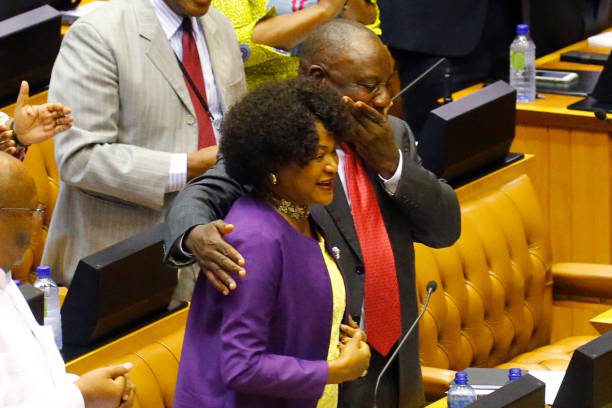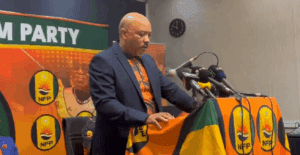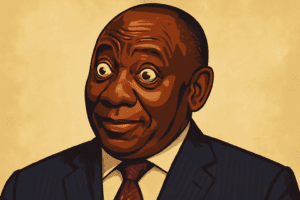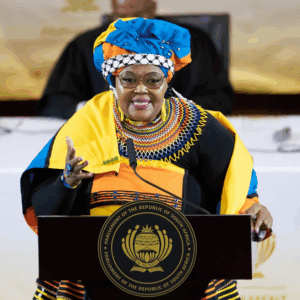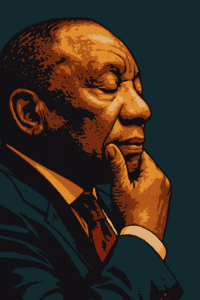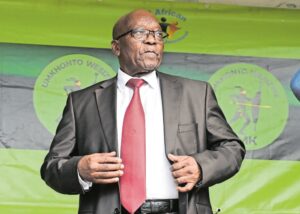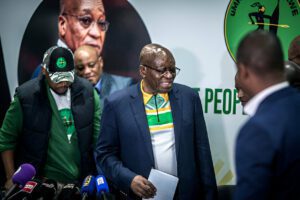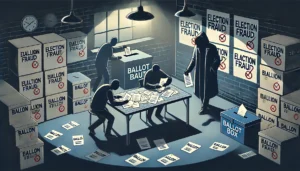As the list of anti-Zuma ANC members grow, Baleka Mbete, the former National Chairperson of the African National Congress (ANC) and ex-Speaker of the National Assembly, has seemingly been deployed by the Ramaphosa administration, and has voiced her dismay at Jacob Zuma’s recent political maneuver. Zuma, the former President of South Africa, has thrown his support behind the Umkonto weSizwe party as the country approaches the elections scheduled for May 29th.
Mbete articulated her astonishment at Zuma’s willingness to campaign for a different party, despite his longstanding association with the ANC—a party that boasts over a century of history. Her reaction underscores a broader sense of betrayal felt by many within the ANC, reflecting on Zuma’s legacy and current choices.
“It is disappointing for those that worked with him that thought we knew him but off-course he has now defined himself differently. I think South Africans must just be very sober in analysing what this means, who this person is and what he represents.”
Amidst this political quake, the Electoral Court in Bloemfontein has temporarily paused judgment in the case between the ANC and the Umkhonto weSizwe (MK) party, further intensifying the anticipation around the fallout from Zuma’s controversial endorsement.
A Unified Chorus of Disapproval
Mbete’s remarks form part of a larger chorus of disapproval emanating from various corners of the ANC leadership and its supporters. Her surprise at Zuma’s actions is echoed by a sentiment of disillusionment with his choice to support an opposing party—a decision that not only challenges the ANC’s unity but also raises questions about loyalty and political integrity.
She criticized Zuma’s contradictory stance, highlighting the impossibility of campaigning against a party while claiming to be its member. This contradiction, according to Mbete, is a clear deviation from the values that fueled the struggle for liberation, a struggle that both she and Zuma were part of.
“You can’t be a member of the ANC and campaign against it; that’s a contradiction. He has defined himself as not subscribing to the values of what let us struggle,”
Mbete shared these thoughts while commemorating the Battle of Cuito Cuanavale in Angola, an event that symbolizes resistance and unity, starkly contrasting with the current divisiveness.
Other prominent figures, including trade unionist Zwelinzima Vavi and ANC Secretary-General Fikile Mbalula, have also voiced their concerns, signaling a deeper introspection within the party about its direction and leadership. Vavi, in particular, regrets his past support for Zuma, labeling it a “tragic mistake” and reflecting on the impact of Zuma’s leadership on the country and the ANC.
Mbalula and ANC Youth League president Collen Malatji further highlighted the strategic challenges posed by Zuma’s actions, suggesting a deliberate attempt to fragment the ANC’s support base through the promotion of smaller political entities.
The Implications of Zuma’s Political Shift
As the nation braces for the upcoming elections, the spotlight on Zuma’s decision not to support the ANC but to endorse a newly-formed political entity poses pressing questions about the implications for South Africa’s political landscape. This move not only reshapes Zuma’s political legacy but also prompts a broader discussion on party loyalty, leadership, and the future of the ANC.
As this saga unfolds, one cannot help but ponder: What are the underlying motives behind Zuma’s support for the Umkonto weSizwe party, and how will this decision impact the ANC’s performance in the upcoming elections?
The discourse around Zuma’s recent political choices reveals a complex web of loyalty, strategy, and ideological divergence. It beckons South Africans to critically evaluate the dynamics at play, understanding the historical significance of the ANC and the evolving political narratives that continue to shape the nation’s future.

